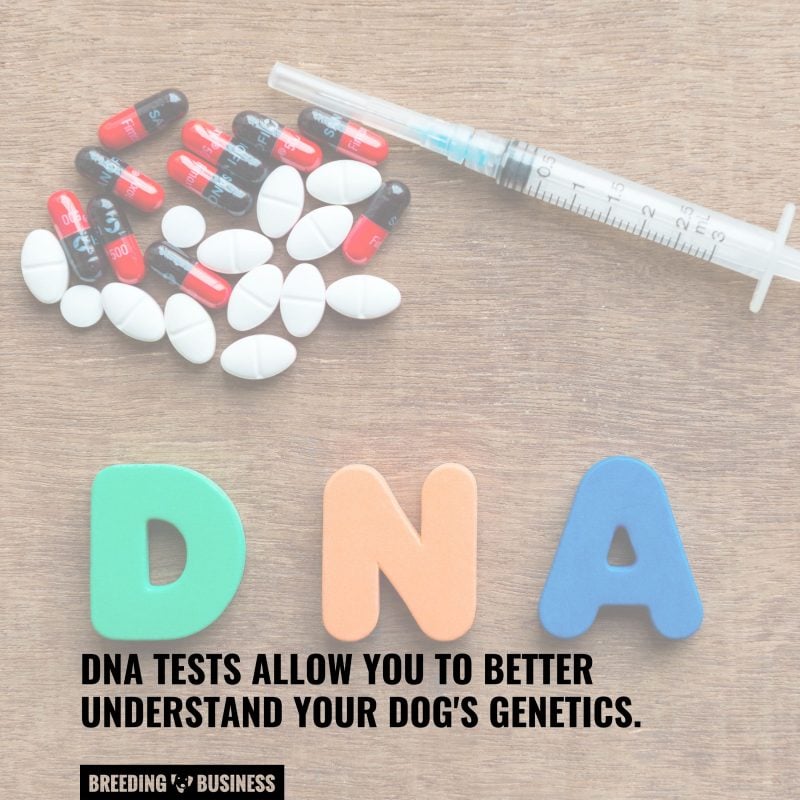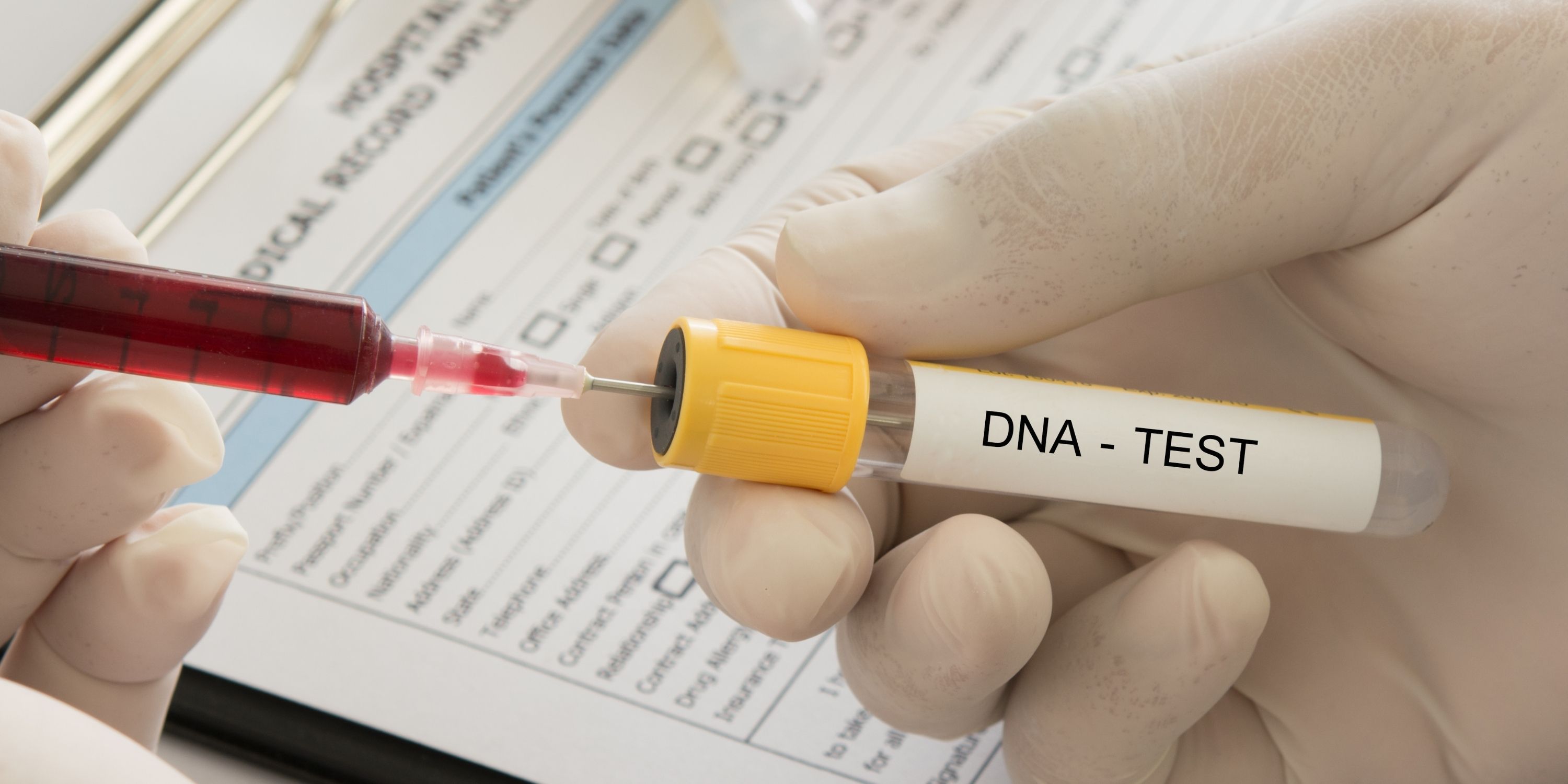Many pet parents wonder what breeds make up their dogs, and a dog DNA test can help to reveal just what makes their pooch special. But just how accurate are dog DNA tests? And how do they work in the first place?
DNA tests for dogs are quick and simple to use, so it’s no wonder that pet parents are using them. However, it’s important that customers are aware of what they’re getting when they buy a dog DNA test. Here, we discuss the methods that the most popular manufacturers use to see where current testing methods are excelling or lacking!
How Do Dog DNA Tests Work
There are two leading manufacturers of dog DNA tests, and both use similar methods to collect the samples!
The Embark test kit includes a sponge-like applicator, a prepaid postage box, and a collection tube. To start the test, gently rub the sponge inside your dog’s cheek for at least 30 seconds to collect enough saliva. Then, place the sample in the provided collection tube and shake it for 10 seconds. Finally, seal the tube inside the plastic bag, activate your kit online, and send it in the mail! You will receive your dog’s results within two weeks of the company receiving the sample.
The Wisdom Panel test kit comes with two swabs, a prepaid postage box, and a protective sleeve. First, take out the swabs, making sure not to touch the bristles. Then, gently rub the swab’s bristles against the inside of your dog’s cheek, being careful not to hurt your dog. Allow the samples to dry for five minutes, and then place them back inside the sleeve. Finally, activate your kit online and drop off the bag in the prepaid postage box. You will receive your pet’s results within two to three weeks of the company receiving your sample!
Dog DNA tests are important, especially for breeders who are preparing to sell their dogs

Accuracy of Dog DNA Tests
Ancestry inference is highly valuable for pet owners. It not only helps settle debates about a dog’s lineage but also provides insights into potential health issues they may face in the future. For instance, if your dog’s ancestry includes a breed known for a high cancer incidence, you might consider more frequent screenings. However, as with any emerging genetic analysis, dog DNA tests pose challenges and uncertainties. One crucial challenge is the number of genetic markers a test can examine. For example, Embark now has over 200,000 genetic markers at its disposal, while other tests may have fewer, leading to reduced accuracy.
Additionally, different manufacturers employ different methods to analyze your dog’s DNA. Paw Print Genetics, Gensol Diagnostics, and Laboklin use the Single Mutation Test, whereas Embark and Genoscoper Labs employ Microarray Genotyping. Before making a purchase, it’s essential to confirm that the manufacturer uses your preferred method.
Let’s take a closer look at these methods:
Single Mutation Testing
Single mutation tests make use of PCR (Polymerase Chain Reactions) to get their results. The PCR method makes use of heat to “unwind” the DNA, then cools it to allow for short DNA fragments, known as primers, to bind to the DNA. Primers are made to specifically bind to a region of your dog’s genome. The temperature is then adjusted again. This is to allow a special enzyme to make new DNA, complementary to the unwound DNA template. With just one cycle, this doubles the number of DNA couples. If this is done another 40 times, you increase the number of DNA molecules 2^40 times!
If your dog happens to have a mutation in their DNA that the primer should bind to, it’s possible for the primer not to bind at all. This can lead to false-negative results. Embark specifically discusses an incident where a mutation in the SOD1 gene led to degenerative myelopathy false negatives for high-risk breeds. To reduce this risk, most single mutation services apply two or more different assays to increase confidence in the results. Not only this, but contamination is a huge issue for single mutation analysis! By taking a single copy of DNA and amplifying it 2^40 times, the possibility of another dog’s DNA getting amplified is entirely possible. Because of this, stringent methods to control contamination are necessary.
The main downside to this test, however, is that it only reveals information at one genomic point of interest. You will glean no more data from your sample. This means that another test must be done if you want more information. In other words, to pair the genetic results to your specific dog, the laboratory relies on the client accurately reporting sex, breed, and parentage. This can cause accidental sample mix-ups that would not happen with microarray technology!
Microarray Technology
Microarray technology makes use of a microchip to allow for high-volume, automated analysis of several pieces of DNA at the same time. To do this, companies like Embark use an “SNP chip.” SNP means “single nucleotide polymorphism.”
Embark’s SNP chip makes use of the Illumina Canine HD SNP array, which makes use of over 200,000 genetic variants in dog breeds for more accuracy. To test your dog’s DNA, Embark uses synthetic DNA probes with fluorescent chemicals in them. Where your dog’s DNA binds to a DNA probe, the chemical fluoresces at a certain color. The microarray defines your dog’s genotype based on the intensity and wavelength of this fluorescence! In short, Embark will evaluate what color your dog’s DNA fluoresces at. And, since they know which colors belong to each genetic variant, they can infer your dog’s genotype!
With this type of testing, a lab can investigate several areas of your dog’s genome all at once. This is in contrast to the single mutation assay, which requires the use of several tests to get the same information. Embark claims that their probes are 99.9% accurate or higher. They also use 3 to 8 separate probes for every health condition to ensure accuracy. So, compared to single mutation testing, microarray technology appears to come with fewer risks and may well be the most accurate method.
Risks of DNA Tests
Dog DNA tests provide valuable insights into a dog’s health. However, it’s important for owners to understand that they should not make medical decisions for their pets solely based on DNA testing results. If a DNA test suggests a vulnerability to a certain health condition, it doesn’t mean that the dog will definitely develop it. It simply serves as a warning, not a definitive diagnosis. Additionally, there are instances where a DNA test may not detect certain health problems, especially with single mutation assays.
If you are a dog breeder, it’s crucial to study your dog’s pedigree and conduct breed-specific health testing. Relying solely on a DNA test is not enough to ensure that your dog is free from health conditions, particularly for conditions like hip dysplasia. If you have concerns about your dog’s health, always consult your veterinarian. A DNA test is not a diagnostic tool that can replace the expertise of your vet.
Dog DNA Tests Accuracy – FAQs
Have any more questions about dog DNA tests? Feel free to look through our Frequently Asked Questions for more details. If in doubt about your dog’s ancestry, consider asking your vet about your best options.
The accuracy of dog DNA tests varies from manufacturer to manufacturer. To date, no dog DNA test is 100% accurate. Even between the two most accurate dog DNA tests, there are slight differences in results – while Embark offers one result, Wisdom Panel may offer another. Interestingly, however, Embark claims to have a 99.9% accuracy rate. Unfortunately, dog DNA tests are not regulated by the FDA – this means that a DNA testing laboratory is not obligated to share its protocols, its data, or any statistics about its accuracy with them. Because of this, vets warn to take their pet’s results with a grain of salt.
Embark and Wisdom Panel are widely regarded to be the most accurate dog DNA tests. Because of this, many owners will cross-reference the two tests. Some will compare results from the two to get the most accurate information. Both laboratories use microarray technology.
A vet will see many different breeds in their clinic and will have a good eye for dog breeds as a whole. If your dog is a mix, a vet may be able to use their experience to guess what breeds make up your pooch. However, visual guesses are not always accurate, and results may vary from person to person!
The term “Supermutt” is used by Embark to describe a mixed breed with uncertain ancestry. Many dogs descend from other mixed breed dogs, sometimes so far back in your dog’s ancestry that their DNA cannot be assigned to one particular breed. When this happens, Embark assigns your dog a “supermutt” label in their ancestry breakdown. They will also suggest what breeds might make up this percentage. Other dog DNA tests might refer to this percentage as an unknown breed.
Dog DNA tests are a fairly accurate way to see what breeds make up your pooch. However, the technology is still advancing, and not all results are completely accurate. Do not rely on a dog DNA test to diagnose your dog’s health conditions – always speak to your vet if you have any questions or concerns!
